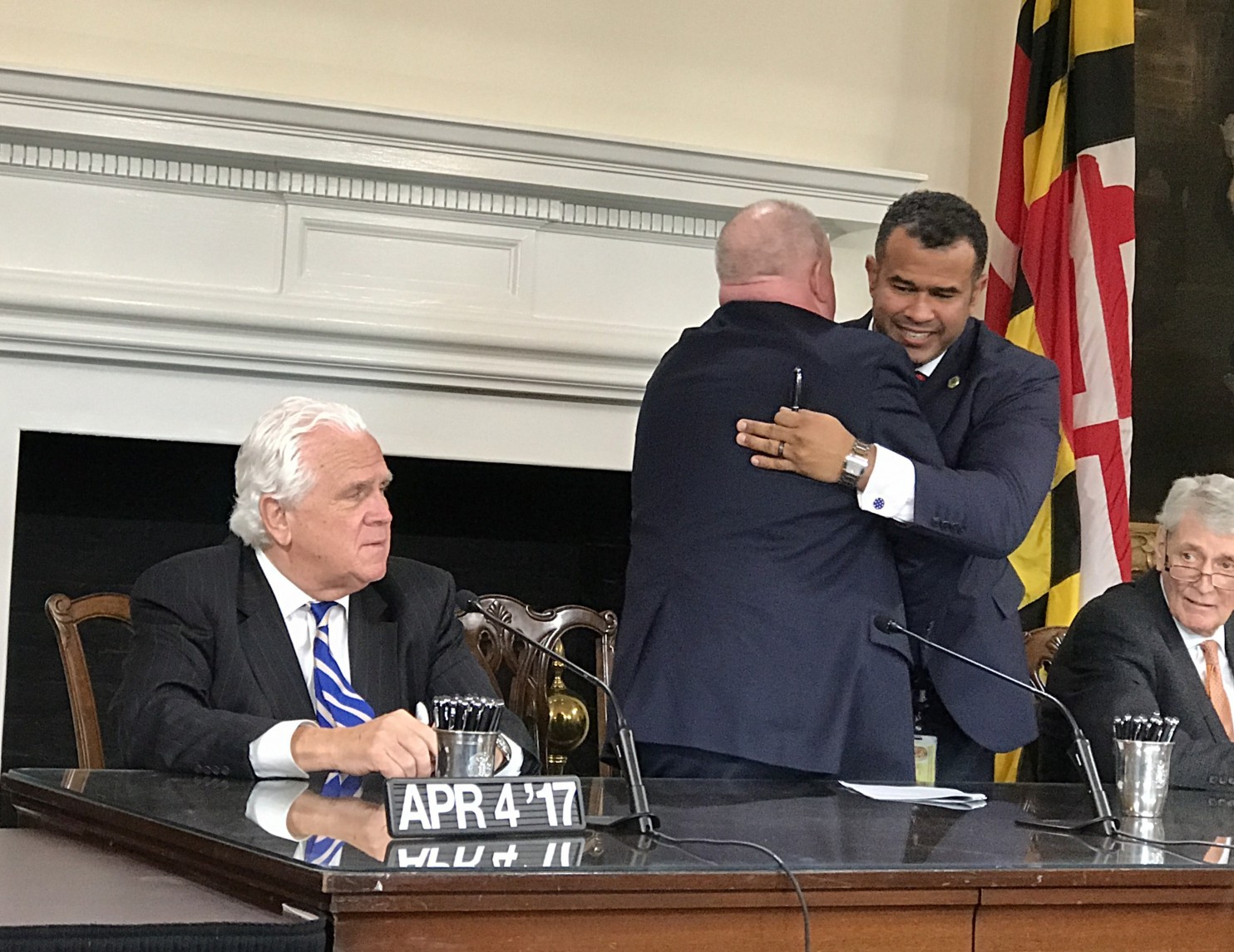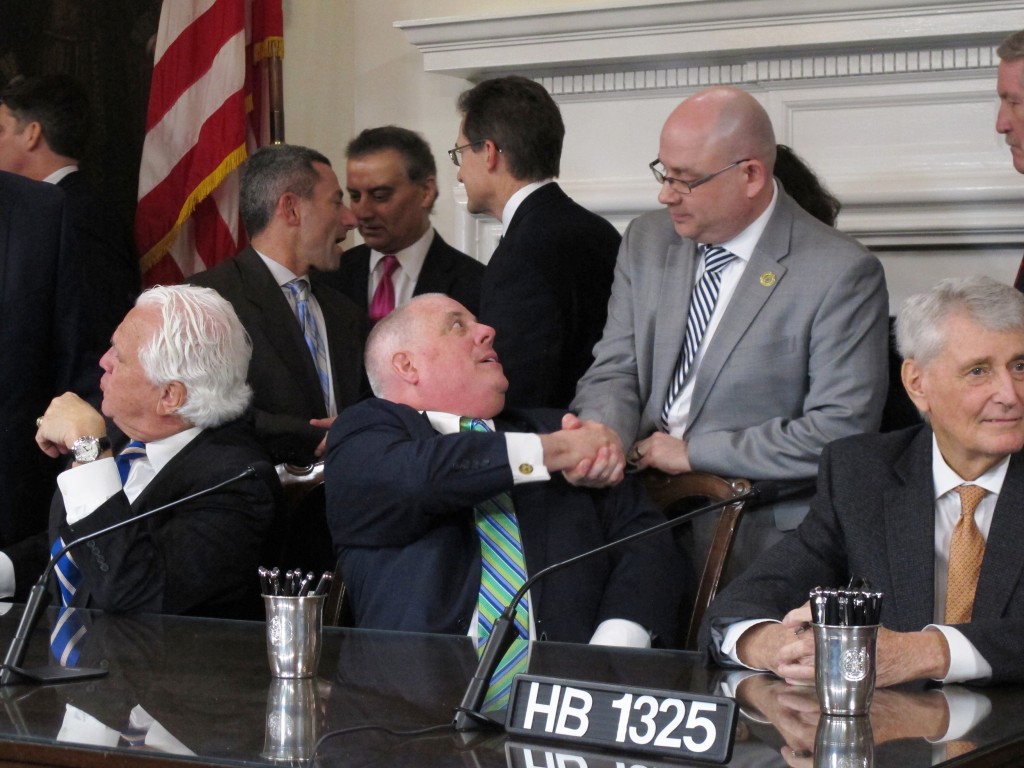As a Child, He Was Raped. As a Lawmaker, He Ensured Victims Have More Time to Sue.
By Ovetta Wiggins and Josh Hicks
Del. C.T. Wilson (D-Charles) testified for three straight years before his fellow Maryland lawmakers about how his adoptive father repeatedly raped him, pleading with them to increase the amount of time sexually abused children have to sue their abusers. And each year that his bill died in committee, Wilson vowed to sponsor it again. On Tuesday, he was cheered as he joined Gov. Larry Hogan (R) to watch him sign the bill, approved by the legislature, into law. It increases the window of time a victim of child sexual abuse has to file a lawsuit from age 25 to 38. “I never wanted to share my personal business on this level, but I did it because I thought it would help people,” Wilson said shortly after the bill signing. “I wanted the victims of sexual abuse to know they are not alone and that we care about them.” Wilson’s bill was one of seven measures signed by Hogan on Tuesday, with a week to go in the annual legislative session.
The governor also signed a bill to permanently ban hydraulic fracturing in the state, ending a more-than-five-year debate over whether to allow the gas-extraction method. Hogan had expressed tepid support for fracking until last month, when he surprised environmentalists by calling for a ban. He had said he would back the extraction method if the state could develop regulations strict enough to protect public health and the environment from serious harm, but he said last month that he did not think the practice could occur safely. When Wilson walked to the table for the signing of the statute-of-limitations bill, Hogan gave him a bear hug and thanked him for his courage and leadership on the issue. Wilson spoke each year about how he was shuffled among foster care homes until he was adopted by a man who was a kindergarten teacher, a Cub Scout leader, a junior pastor — and a pedophile. He said he was raped by his adoptive father from 8 to 16 and did not begin to deal with the trauma until years later. Wilson’s bill had been strongly opposed by the Catholic Church. Del. Joseph F. Vallario (D-Prince George’s), the chairman of the House Judiciary Committee, refused to allow it to come to a vote in his committee. This year, Wilson worked with the Maryland Catholic Conference on the bill, with help from Vicki Gruber, chief of staff to Senate President Thomas V. Mike Miller Jr. (D-Calvert). Changes included making clear that the statute would not be retroactive and would apply only to victims 18 or younger at the time of its passage. The bill gives those victims until age 38 to file a lawsuit against a person or governmental entity that “owed a duty of care to the victim,” employed the alleged abuser or had “some degree of responsibility or control over” the alleged abuser. Mary Ellen Russell, the executive director of the Maryland Catholic Conference, said this year’s bill “was much fairer than in years past.” For Wilson, the bill signing closed an ugly, painful chapter. “It was an emotional experience,” he said. “You basically have to dig deep and reveal yourself. You can’t help but be ashamed, but I’m not a victim. I don’t define myself as a victim.” He said he knows a lawsuit is not a “silver bullet” for sexual abuse victims, “but what it does is give them a voice. .?.?. That’s what most people want. They want someone to acknowledge what they’ve done.” Also on Tuesday, the Senate allowed Sen. James C. Rosapepe (D-Prince George’s) to introduce an emergency late-file bill that would enshrine in state law the federal Internet-privacy regulations created by the Obama administration. On Monday, President Trump signed legislation that repeals those federal privacy protections. The 33-to-14 vote to allow the bill comes a day after Republicans in the House of Delegates blocked a similar effort by Majority Leader C. William Frick (D-Montgomery). Rosapepe’s bill would prevent an Internet-service provider from selling or transferring customers’ names, addresses, Social Security numbers or Web browsing histories without permission. It also would bar providers from sending advertisements to customers based on their browsing histories. Minority Leader J.B. Jennings (R-Baltimore County) opposed the introduction of the bill in the Senate, saying the General Assembly should not take on a federal issue. “I don’t think this bill is needed,” he said. “It is something that should be done on the federal level.” Maryland also took another step toward becoming the eighth state in the country, in addition to the District, to require employers to provide paid sick leave to workers. On Tuesday, the House Economic Matters Committee voted to concur with the changes made to the bill in the Senate, which requires employers that have 15 or more workers to offer up to five days of paid sick leave a year.
|
.
Any original material on these pages is copyright © BishopAccountability.org 2004. Reproduce freely with attribution.

